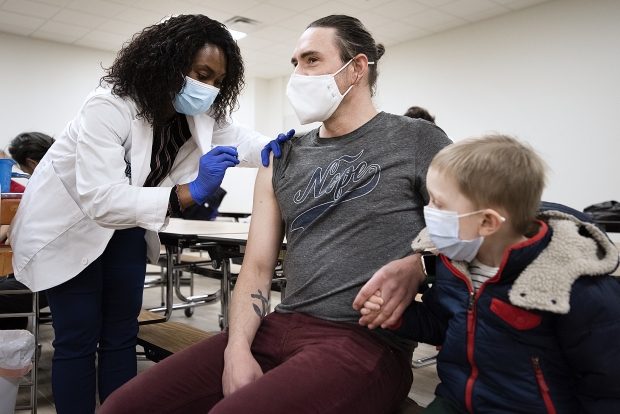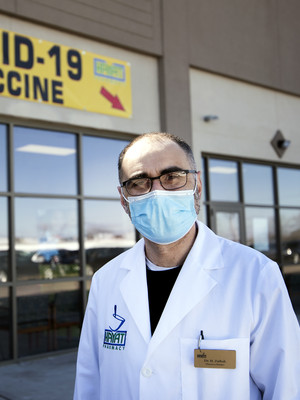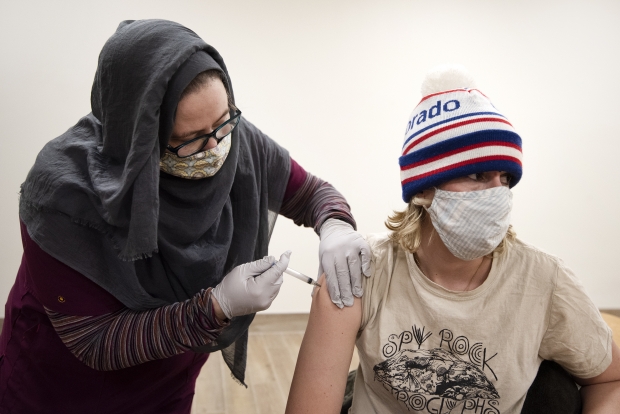Pandemic Shows Value of Local Pharmacies
Hayat Pharmacy has 12 locations and a staff that speaks 22 languages.

Scott Mizzen of Milwaukee holds hands with his son, Harrison, as he receives a COVID-19 vaccine Thursday, March 11, 2021, at Hayat Pharmacy in Milwaukee, Wis. Angela Major/WPR
The COVID-19 pandemic has changed the role of community pharmacies and the ways the public interacts with them, especially in underserved areas.

Pharmacist Hashim Zaibak stands outside of Hayat Pharmacy where COVID-19 vaccines and testing are offered Thursday, March 11, 2021, in Milwaukee, Wis. Angela Major/WPR
Dr. Hashim Zaibak — who heads Milwaukee’s Hayat Pharmacies with more than 12 locations and a staff that speaks 22 languages and dialects — said pharmacists and technicians are becoming more recognizable as reliable health care providers and not just medication dispensers.
“COVID came and it really showed the value of pharmacists,” Zaibak said on WPR’s “The Morning Show.” “Now, we are educators. We are going to the community. We’re telling people why they should get vaccinated.”
Zaibak, whose pharmacies work to reach historically underserved communities, said that Hayat started a program for home vaccinations to get to people who might be homebound. The program connects pharmacists and nurses with people who need assistance.
“We also have worked with some churches who have their own minivans or similar transportation tools to bring people to our pharmacies to get vaccinated,” he said.
As educators, Zaibak said his pharmacies’ staff also are dispelling myths about the vaccine that have run rampant on social media sites, for example that the vaccine can make people infertile, that the vaccine kills people, that the government is exaggerating the gravity of COVID-19 and that COVID-19 is just a myth.
Zaibak said since the delta variant’s arrival, his pharmacies are testing about 200 people a day, compared to 15 to 20 people prior to delta.
People can go to the pharmacy to get a PCR test, which is free to them, but takes a day or two to get results. Quicker results can be had with antigen tests that people can buy for $25 and perform on themselves or pay $66 to get tested in the pharmacy — though rapid tests aren’t always accepted as proof of not having the virus.

Milwaukee resident Carolina Oakley receives a COVID-19 vaccine Thursday, March 11, 2021, at Hayat Pharmacy in Milwaukee, Wis. Angela Major/WPR
Zaibak said those who aren’t sure how to navigate finding their results online return to the pharmacy for help printing their results.
“That’s the beauty of being a community pharmacy,” he said. “We’re not the super large organization. We’re small enough where we know our community and we know what’s needed and how to take care of them and how to change the system a little bit to make it easy for people.”
He said in pharmacy organizations, there’s often five or six technicians per every pharmacist, so giving them the ability to help vaccinate tens of thousands of people has changed pharmacies’ efficiency and reach.
“These technicians are well-trained, certified, and yet in the past, they couldn’t do this,” he said. “But now they can. And that’s beautiful.”
Allowing technicians to vaccinate is one example of how the pandemic has “opened doors” that help prove the value of community pharmacies.
“We are the most accessible health care professionals in the nation,” he said.
Listen to the WPR report here.
Pandemic Highlights Value Of Community Pharmacies was originally published by Wisconsin Public Radio.
More about the Coronavirus Pandemic
- Governors Tony Evers, JB Pritzker, Tim Walz, and Gretchen Whitmer Issue a Joint Statement Concerning Reports that Donald Trump Gave Russian Dictator Putin American COVID-19 Supplies - Gov. Tony Evers - Oct 11th, 2024
- MHD Release: Milwaukee Health Department Launches COVID-19 Wastewater Testing Dashboard - City of Milwaukee Health Department - Jan 23rd, 2024
- Milwaukee County Announces New Policies Related to COVID-19 Pandemic - David Crowley - May 9th, 2023
- DHS Details End of Emergency COVID-19 Response - Wisconsin Department of Health Services - Apr 26th, 2023
- Milwaukee Health Department Announces Upcoming Changes to COVID-19 Services - City of Milwaukee Health Department - Mar 17th, 2023
- Fitzgerald Applauds Passage of COVID-19 Origin Act - U.S. Rep. Scott Fitzgerald - Mar 10th, 2023
- DHS Expands Free COVID-19 Testing Program - Wisconsin Department of Health Services - Feb 10th, 2023
- MKE County: COVID-19 Hospitalizations Rising - Graham Kilmer - Jan 16th, 2023
- Not Enough Getting Bivalent Booster Shots, State Health Officials Warn - Gaby Vinick - Dec 26th, 2022
- Nearly All Wisconsinites Age 6 Months and Older Now Eligible for Updated COVID-19 Vaccine - Wisconsin Department of Health Services - Dec 15th, 2022
Read more about Coronavirus Pandemic here




















